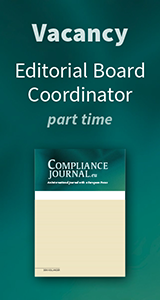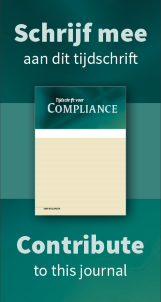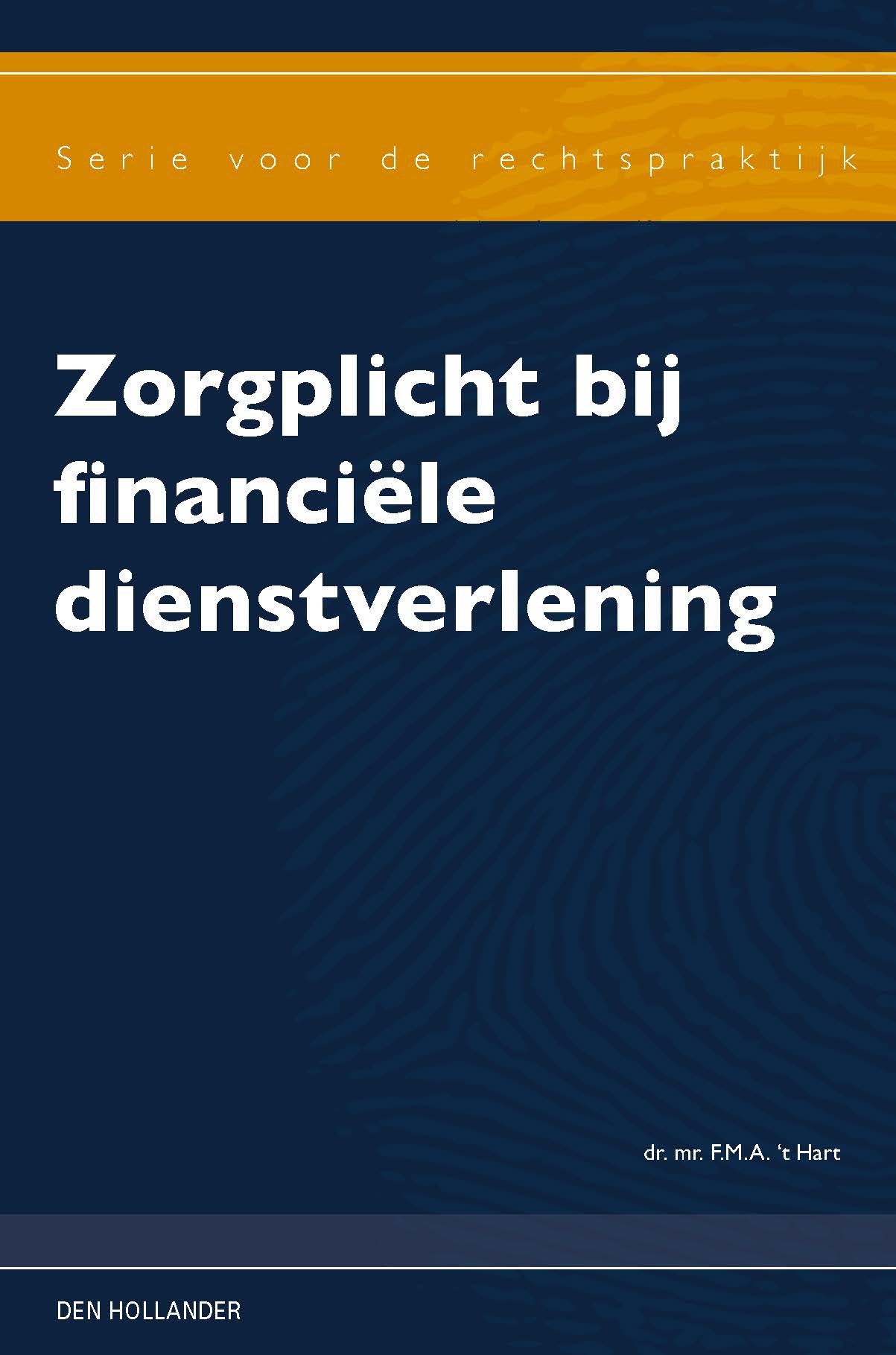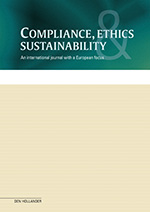The compliance function
Het artikel is in de opmaak van het tijdschrift rechts als pdf beschikbaar.Welcome to the final edition of 2024 of the Compliance, Ethics & Sustainability Journal. In this edition we return to examine the Compliance Function. A number of interesting views are gathered together, getting to the heart of issues that organisations struggle with on a daily basis. The first articles focus on the structuring of the compliance (and ethics) function, the subsequent articles provide insight into handling (new) topics that compliance functions are and will be facing.
Banking with a conscience – A practical example from the Netherlands
Edgar Karssing, Françoise Rost van Tonningen, Stefan Louwers, Tuğba Arik and Roderick Noordhoek
'For decades, ethics was simply equated with legal compliance. Now our view of what it takes to be a "good company" extends far beyond the boundaries of the law. Questions of ethics have come to reflect how a business impacts social, environmental, and political systems, and vice versa; a company can no longer operate solely as a self-interested, profit-maximizing black box'. The authors endorse this statement by Alison Taylor, author of Higher Ground: How Business Can Do the Right Thing in a Turbulent World. The authors add that unfortunately, Taylor also concludes that there is 'no playbook to help executives navigate this new world'. However, Taylor mentions several initiatives as sources of inspiration. For example: 'Consider Dutch bank Rabobank's dynamic approach to ethical challenges. Its Ethics Committee, which includes young employees, considers the ethics surrounding emerging issues such as AI and cryptocurrencies and sustainability dilemmas such as whether to source solar panels from Xinjiang'. In their article the authors will discuss Rabobank's Ethics Committee. They cannot provide a playbook either, but by sharing experiences from within the organization they hope to inspire others.
De compliance functie als secure base: care to dare
Ingrid Walrecht en Joyce Hofmans-Vogels
De compliance functie ligt onder een vergrootglas. Bijna wekelijks berichten de media over nieuwe integriteitskwesties, ongewenst gedrag en intimidatie. Niet alleen in de politiek en de entertainmentwereld. Ook in het bedrijfsleven zien we ernstige integriteitsschandalen als gevolg van incompetentie en falen aan de top. Het meest in het oog springende, recente schandaal is de examenfraude in de accountantssector, waarbij nota bene is gefraudeerd met toetsen die zijn gericht op de professionele integriteit. Het is exemplarisch voor het zware weer waarin compliance zich bevindt. Het simpelweg toezien op het compliant zijn en blijven vanuit wet- en regelgeving, KPI's en intern beleid, ook wel hard controls genoemd, is al langer ontoereikend. Andere instrumenten ter bevordering van integer gedrag zoals onder andere aanspreekbaarheid, helderheid en voorbeeldgedrag, doorgaans aangeduid met soft controls, zijn belangrijker dan ooit en vragen om een nadere beschouwing van de compliance functie. In deze bijdrage bepleiten de auteurs een verbreding, verschuiving en verdieping van de compliance functie, waarbij het bevorderen van moraliteit en een integere bedrijfsvoering door het vergroten van de psychologische veiligheid binnen organisaties centraal staat. Zij focussen daarbij op wat zij hun werkterrein noemen: het verleggen van de focus naar de binnenkant van compliance, door het institutionaliseren van secure base leiderschap. Ofwel: het vergroten van het zelfleiderschap van bestuurders, compliance functionarissen en medewerkers, waarmee de morele kwaliteit van ieders handelen binnen organisaties wordt vergroot.
'Illegal service providers are mostly afraid of reputational damage'
Jeroen Boogaard
The Dutch central bank (DNB) has been battling illegally operating crypto firms for some time. This has resulted in several significant penalties for some of the largest cryptocurrency exchanges illegally operating in the Netherlands in 2022. Starting next year, the AFM will be responsible for supervising crypto service providers, while DNB will shift its focus to trust offices and payment service providers. In addition, DNB allocated more resources to tackle unlicensed activity. Jeroen Boogaard spoke with Michel Oerlemans, Supervisor at DNB, and his colleague Silvie Verkaart, Head of Department Financial Crime Supervision, about their working methods and recent developments in their field. The article provides therefore valuable insights for all compliance officers working in the financial industry.
It's All About the Data – Regulatory Barriers to Cross-border Investigations
Arnaud Collombet, Erin McDonald, Paul Menoret-Renard and Edward Nkune
With the continued rise of multinational corporations straddling the world, the increase in global compliance requirements, and the continued backdrop of multi-jurisdictional oversight it is no surprise that there have been a number of high-profile cross-border investigations hitting the headlines. In their article, Arnaud Collombet, Erin McDonald, Paul Menoret-Renard and Edward Nkune look at some of the largest and most complex global matters and discuss whether some of the most difficult barriers preventing a successful outcome centre around the demands involved with accessing, preserving and transmitting the evidential data across borders. The article examines some of the issues and suggests how they are best addressed and managed.
Navigating the Travel Rule: Bridging Regulatory Gaps in Traditional and Crypto Financial Systems
Casper Westerink
National governments and international bodies have tried over the years to enhance payment transparency via a variety of regulatory frameworks in order to effectively counter money laundering and terrorism financing. In this article, the author examines one of the most important regulatory requirements in this field: the travel rule. Initially crafted to address gaps in traditional financial transfers, the travel rule has since evolved to include the fast-growing world of crypto assets. The European Union's recent adoption of the Recast Wire Transfer Regulation (WTR3)signifies a critical shift, ensuring that Crypto-Asset Service Providers (CASPs) comply with stringent anti-money laundering and counter-terrorism financing measures. In this article the author delves into the origins, evolution, and implementation of the Travel Rule, highlighting the unique challenges and implications of its application to the crypto sector.
The new Dutch act on international sanctions measures: a first analysis
Yvo Amar
Almost immediately after the Russian invasion of Ukraine, the EU implemented a sanctions regime against Russia—one unlike anything it had imposed before—against a country that had long been an important, though controversial, business partner and major energy supplier. However, the existing sanctions framework and resources in many EU member states, including the Netherlands, proved to be insufficient to address challenges posed by the new sanctions. In response, the decision was made in the Netherlands to establish a specialized team within the Dutch Ministry of Foreign Affairs to draft new sanctions legislation as the Sanctions Act 1977 was no longer suited to the current reality, and new powers and obligations were needed to ensure full compliance. This article examines the introduction of this new legislative proposal which is deemed to modernize the Dutch sanctions framework, the Wet Internationale Sanctiemaatregelen ('Wis'). The author succinctly discusses the origin of the legal proposal after which he delves into the key provisions of the legal text while also taking into account valuable input from market participants during the first consultation of this important draft legislative. Making the article an interesting read for compliance officers working in the sanctions domain.
Uit de boekenkast van de bedrijfsethiek (92)
Edgar Karssing
In de bedrijfsethiek is een groot aantal boeken en artikelen verschenen waarin op praktische wijze prangende vraagstukken worden behandeld en concrete aanbevelingen worden gedaan voor het bevorderen van de ethiek en integriteit van organisaties en hun medewerkers. Niet iedereen weet deze publicaties te vinden of heeft tijd ze te lezen. Daarom kijkt Edgar Karssing geregeld voor het Compliance, Ethics & Sustainability Journal in de boekenkast van de bedrijfsethiek en bespreekt hij een artikel of boek. Deze bijdragen zijn geen recensies, maar een samenvatting van de belangrijkste conclusies en aanbevelingen van de auteur(s), die hij zal confronteren met zijn eigen observaties als onderzoeker, trainer en adviseur op het gebied van ethiek en integriteit.
De boekbespreking in deze editie gaat over volgerschap. Goed leiderschap krijgt terecht (veel) aandacht maar waar is de aandacht voor goed volgerschap. Geen leiders zonder volgers. Goede volgers zijn geen makke schapen die springen wanneer de leider 'Spring!' roept. Goede volgers zijn loyaal, niet aan de baas maar aan de doelen die men in gezamenlijkheid wil bereiken. Goede volgers zullen de leiders ook helpen om een goede leider te zijn. Kortom, goed volgerschap is veeleisend en je mag trots zijn als je in deze rol excelleert. Maar wat houdt dat dan precies in, wat moet je willen en kunnen, wat is de ethiek van goed volgerschap, tegen welke dilemma's loop je aan en, niet onbelangrijk, wat betekent dit voor de compliance of ethics professional? In deze boekenkast bespreekt Edgar het boek The courageous follower van Ira Chaleff. Chaleff beschrijft op gestructureerde wijze wat een goede volger is en wat dit concreet betekent, en hij geeft heel veel praktische tips en aanwijzingen. Soms zelfs op het niveau van zinnen die je kunt gebruiken bij het aanspreken van een leider. Daarnaast maakt Edgar gebruik van enkele inzichten uit Volgen voor gevorderden van Caroline Perrée.
We hope you enjoy reading this edition over the festive period.
Bartheke Weerstra, Arend Koper, Claudia Sijstermans & Edward Nkune




